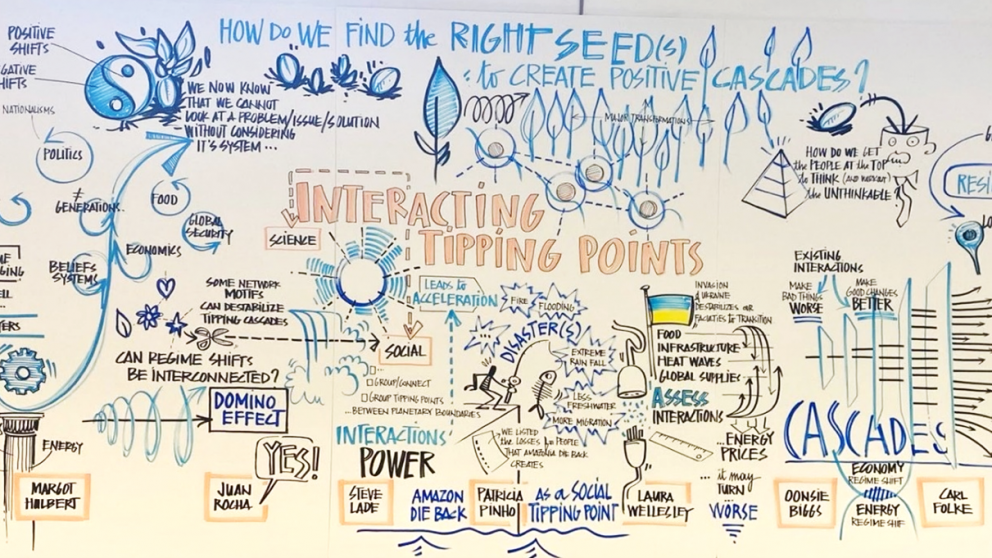Can positive social tipping points prevent climate collapse?
29.09.2022

In mid-September, the first interdisciplinary Global Tipping Point Conference was held at the University of Exeter/ UK in collaboration with the Potsdam Institute for Climate Impact Research (PIK).
The leitmotif of the conference, which attracted around 250 participants, was the threat posed by bio-physical tipping points that would alter the climate system and lead to abrupt, irreversible, and dangerous impacts with serious implications for humanity. This warning was further amplified by recent research from McKay et al (2022), which found that even global warming of 1°C, a threshold that we already have passed, puts us at risk by triggering some tipping points. Their research suggests that there are 16 bio-physical and ecological systems that are close to or have already passed a tipping point. These include the collapse of Greenland’s ice cap, resulting in massive sea level rise, the collapse of a key current in the north Atlantic, disrupting rain upon which billions of people depend for food, and an abrupt melting of carbon-rich permafrost. According to Johan Rockström, one of PIK’s directors, we only have 8 years left until we exhaust our emission budget and head towards 2 or 3 degrees of warming, with even more severe implications.
While most of this is common knowledge, the dire news is that we have less and less time to act. A significant acceleration in the societal transformation is necessary. To meet this challenge, natural scientists and, increasingly, social scientists are applying the natural scientific concept of tipping points to social-economic systems, which constituted the second focus of the conference. Like their natural counterparts, there is agreement that all social systems can also cross certain thresholds and then shift radically and rapidly to a new and qualitative different state under certain conditions. A significant difference is seen in the notion of deliberate and actor-driven social tipping processes (Winkelmann et al 2020).
There is a growing interest in understanding how specifically positive tipping points can be activated to accelerate the transformation of our social and economic systems and foster desirable developments and impacts over time (Lenton et al. 2022, Tabara et al. 2020). As indicated by the adjective positive, there is a close connection between tipping points and a normative understanding of a desired future state of a system. But just as a transformative change can harbour opportunities for some stakeholders, it can be destructive for others, in particular those that depend on the established system. For example, while the closure of a coal mine is desirable from an emissions perspective, local communities whose livelihoods depend on the industry might think different. Consequently, it is important to understand who will experience a disruption as positive. (Lenton et al. 2022, Tabara et al. 2020)This is just one of the multiple challenges related to the concept that surfaced at the conference. Further points of contestation were:
First, there is no unequivocal or shared definition of positive social tipping points. Indeed, most presenters used their own definition while applying it to their respective context and topic. Of course, this proliferation of terminology and lack of mutual understanding are typical of an emerging academic field, but in my opinion, it points to the great difficulties to identify tipping points in complex social systems.
Secondly, in contrast to climate or ecological indicators, operationalizing social tipping points remains difficult. Despite some efforts to identify suitable methods to determine and ultimately measure social tipping (Mey and Lilliestam 2020), the complexity of social systems and the multiple dimensions of agency make it challenging to track causes and effects to one specific point in time. One presenter suggested that it would be better to look to “tipping cascades” or “co-evolving tipping dynamics” in smaller and more concise systems such as socio-technical transitions. Indeed, most of the empirical examples came from the field of socio-technical transitions such as the introduction and market penetration of EVs in Norway, the success of solar PV, and offshore wind in the last decades.
Hence, third, there is still a lack of empirical case studies that could more clearly indicate how social tipping points can be identified and whether they can be instigated or only observed ex-post. Here, the Tipping Plus Project will make a contribution with many case studies from tipping dynamics in coal and carbon intensive regions across Europe. As part of the project, we provided the results from our research on the socio-economic transition process in two neighbouring, previously coal-dependent cities – Essen and Duisburg.
Lastly, since there is still quite some uncertainty around the concept, presenters cautioned against viewing positive social tipping as a silver bullet. There are still many unanswered ethical questions such as who can legitimately tip a (democratic) social system, is it even desirable and for whom, can we reasonably predict the consequences of tipping, can we avoid hardship for those most vulnerable? Indeed, most societies fear rapid and profound disruptions of social stability, which are more often associated with wars, revolutions, and violent uprisings.
Nonetheless, there is, undoubtedly, merit in the idea of social tipping – specifically in its metaphorical sense and ability to capture people’s imagination. As one presenter suggested, it may also serve as an anticipatory governance instrument that can influence the public narrative to direct decision-making in the present in order to shape uncertain futures with long time horizons. Despite my own scepticism, the conference ended with a great buzz and excitement about the prospect of social tipping. The new research agenda emerging may hold potential for integrating natural and social science for the deep transformations ahead.
